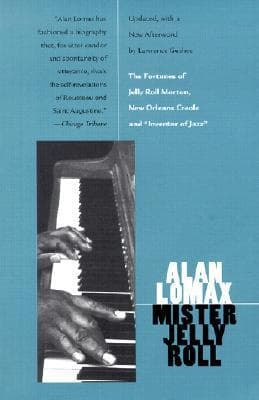
Book Review Summary: Mister Jelly Roll: The Fortunes of Jelly Roll Morton, New Orleans Creole and "Inventor of Jazz" (Updated)
Introduction
Mister Jelly Roll: The Fortunes of Jelly Roll Morton, New Orleans Creole and "Inventor of Jazz" by Alan Lomax is a biography that tells the fascinating story of Ferdinand "Jelly Roll" Morton, one of the world's most influential composers of jazz. Published in 1950 and updated with a new afterword by Lawrence Gushee, this book enchants readers with its captivating narrative and rich historical context. In this article, we will explore the book's author, Alan Lomax, analyze common opinions from readers, and provide reasons for both recommending and not recommending this book.
About Alan Lomax
Alan Lomax was an American ethnomusicologist, best known for his numerous field recordings of folk music from the 20th century. He was also a musician, folklorist, archivist, writer, scholar, political activist, oral historian, and film-maker. Lomax's extensive work in documenting and preserving traditional music has left a lasting impact on the field of ethnomusicology. His dedication to capturing the voices and stories of marginalized communities has made him a significant figure in the world of music and cultural studies.
Analysis of Views
-
Entertaining Storytelling: Readers highly recommend Mister Jelly Roll for its entertaining storytelling. Jelly Roll Morton's life is filled with colorful anecdotes and humorous tales that make for a captivating read. His self-proclaimed status as the inventor of jazz adds a layer of intrigue to his character, making his stories both enjoyable and enlightening.
-
Musical Genius: Morton's musical genius is a central theme in the book. He is considered one of the first jazz composers and his work serves as an important bridge between ragtime and early jazz. Readers appreciate the insights into Morton's compositional process and the freshness of his music, which is full of surprises.
-
Historical Significance: Many readers find Mister Jelly Roll to be a valuable contribution to the study of jazz and American culture. The book provides a comprehensive account of Morton's life and career, highlighting his contributions to the development of jazz music. It also sheds light on the cultural context in which Morton emerged as a musician, offering insights into the social and historical backdrop of early jazz.
-
Engaging Narrative: The book's engaging narrative style keeps readers engaged from beginning to end. Alan Lomax's use of Morton's own words and other research creates a vivid portrait of his life, capturing the essence of the period in which jazz emerged on the American and international scene. The inclusion of scores of Morton's own arrangements, a discography, and an updated bibliography adds depth to the reading experience.
-
Thought-Provoking Content: Some readers find Mister Jelly Roll to be a thought-provoking read that challenges preconceived notions about jazz and its origins. The book delves into the complexities of Morton's personal life and career, revealing conflicts and contradictions that shed light on the broader cultural landscape of early jazz. It also touches on themes such as self-invention, rejection, and heartbreak, providing a nuanced understanding of the creative process in music.
Reasons for Recommendation
-
Entertaining Storytelling: Mister Jelly Roll offers an entertaining narrative that keeps readers engaged from start to finish. Jelly Roll Morton's stories are full of humor and colorful anecdotes that add depth to his character and make for a highly enjoyable reading experience.
-
Musical Genius: The book highlights Morton's musical genius and his significant contributions to the development of jazz music. Readers appreciate the insights into his compositional process and find his music to be fresh, full of surprises, and an important bridge between ragtime and early jazz.
-
Historical Significance: Mister Jelly Roll provides valuable insights into the historical context in which jazz emerged as a musical genre. It sheds light on Morton's role as one of its pioneers and offers a comprehensive account of his life and career. This historical context adds depth to readers' understanding of jazz music and its cultural significance.
-
Engaging Narrative: The book's engaging narrative style captures the essence of the period in which jazz emerged on the American and international scene. Alan Lomax's use of Morton's own words and other research creates a vivid portrait of his life, making it a compelling read for music enthusiasts and history buffs alike.
Reasons for Not Recommendation
-
Limited Perspective: Some readers find that Mister Jelly Roll has a limited perspective on Morton's life and career. While it provides valuable insights into his musical contributions, it does not delve deeply into other aspects of his life or his personal relationships. This may leave some readers feeling that they have not gained a complete understanding of Morton's overall impact on jazz music.
-
Biased Narrative: There are concerns among some readers about Alan Lomax's biased narrative in Mister Jelly Roll. Some feel that he may have embellished certain aspects of Morton's life or presented only certain perspectives to support his own beliefs about jazz music. This can lead to a skewed understanding of Morton's legacy and may detract from the overall value of the book for some readers.
Conclusion
Mister Jelly Roll: The Fortunes of Jelly Roll Morton, New Orleans Creole and "Inventor of Jazz" by Alan Lomax is a highly recommended book for those interested in jazz literature and the history of early jazz music. Its entertaining storytelling, musical genius, historical significance, engaging narrative style, and thought-provoking content make it a compelling read for both music enthusiasts and history buffs alike. While some readers may have concerns about its limited perspective or potential bias, Mister Jelly Roll remains an essential contribution to our understanding of one of the most influential composers in jazz history.